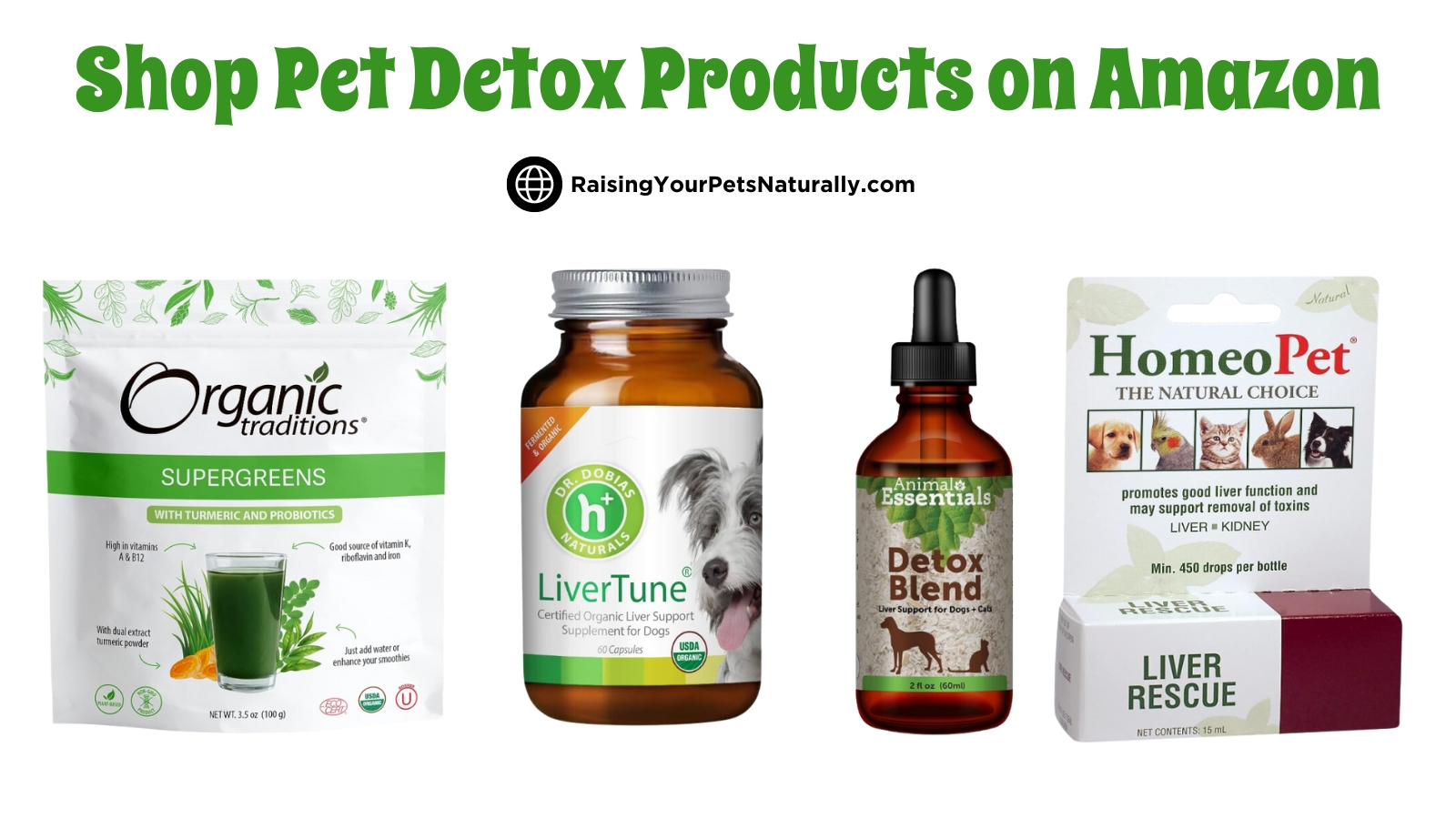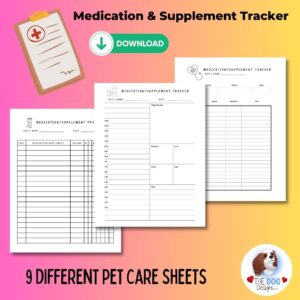Google Adsense—>


Have you ever wondered if you should detox your pet? Detoxifying has grown in popularity as a way to enhance our own health. Have you ever considered if it would also be beneficial for your dog or cat? I have.
My dog, Dexter, is almost fourteen years old. He’s not vaccinated, I don’t apply any nasty chemicals on his body, he gets a bath with one of the best natural dog shampoos, and I feed him a fresh, DIY raw diet, which includes pre-biotic, pro-biotic, and natural enzymes. He drinks clean and filtered water from stainless steel bowls. He’s also happy and stress-free. His dog treats are all-natural and do not contain any “additional” non-food ingredients. Our yard is not chemically treated, and neither are our carpets or floors. We don’t use any air fresheners or other fragrances in our home. We also run three different air filters in our home throughout the day. However, he is a senior dog, does have seasonal environmental allergies, and is on some pharmaceuticals for his Chiari Malformation and MVD. He also goes for neighborhood walks and park adventures.
In this natural pet care blog post, I’ll explore the concept of pet detoxing, its potential benefits, and risks, and provide you with essential tips on how to detox your pet safely.
What is Pet Detoxification?
The term “pet detox” refers to a process that helps your pet’s body get rid of toxins while enhancing general health and well-being. Just like humans, pets can be exposed to various toxins in their environment, such as pesticides, chemicals, and low-quality food ingredients. These toxins may build up in their systems and result in health problems. The goal of detoxing is to help your pet’s natural ability to detox, especially the liver and kidneys, which are essential for filtering and expelling toxins from the body.
Benefits of Detoxing Your Pet
- Improved Immune Function: A good detox can boost your pet’s immune system and lower their risk of infections and disorders by lowering the toxic load on their body.
- Increased Energy Levels: Detoxing can enhance your pet’s energy levels, making them more active and playful.
- Enhanced Digestion: Detoxing can improve your pet’s digestion, which will improve nutritional absorption and general health.
- Reduced Allergies: Detoxification may help alleviate allergy symptoms in pets by reducing the strain on their immune system. After detox, some pets find relief from allergies and sensitivities because their bodies are more capable of handling possible allergen triggers.
- Improved organ function: Detoxification can support the liver and kidneys, which are responsible for filtering and eliminating toxins from the body.
Risks of Detoxing Your Pet
- Dehydration: During detox, increased water intake and frequent urination can lead to dehydration, especially if your pet doesn’t drink enough water to compensate. Dehydration can be dangerous and may require veterinary intervention.
- Electrolyte Imbalance: Detox processes that cause excessive urination can lead to an electrolyte imbalance in your pet’s body. Electrolytes, such as sodium, potassium, and calcium, play essential roles in nerve and muscle function, and an imbalance can result in serious health issues.
- Nutritional Deficiencies: Some detox programs may suggest a restriction of certain foods, which could lead to a nutritional deficiency. Your pet may not get all the necessary nutrients for optimal health during the detox process.
- Stress and Anxiety: If the detox program you are following for your pet involves a change of food or routine, this may cause emotional stress.
- Aggravation of Preexisting Conditions: Pets with preexisting health conditions, such as kidney or liver disease, may not tolerate detoxing well. Programs for detoxification that place additional stress on these organs have the potential to make things worse.
- Negative Reactions: Some pets may have adverse reactions to specific detox methods or supplements. These reactions can range from mild gastrointestinal upset to severe allergic reactions.
- Supplement Interactions: Using herbs and supplements for detox without proper guidance from your dog’s holistic veterinarian can be risky. Some supplements may interact with medications or worsen existing health conditions.
How to Safely Detox Your Pet
Before starting any pet detox program, consult your pet’s holistic veterinarian to determine if detoxing is suitable for your pet’s specific needs and health condition. I will say that again: please contact YOUR pet’s veterinarian before diving in. Each pet is an individual with their own unique needs and health conditions. This blog and the information you find online should only be a starting point to help you with a conversation with your pet’s veterinarian. What works for my dog, Dexter, may not be suitable for your pet.
Before diving into how to naturally detox your dog or cat, let’s talk about the different pet detox frequency options. Knowing those options may help guide your veterinarian in the best detox program and schedule for your pet.
While detoxing your dog or cat can be beneficial in certain situations, it’s not appropriate for all pets. The need for detoxing largely depends on your pet’s lifestyle, overall health, and exposure to potential toxins. Some holistic veterinarians promote regular detoxification during seasonal transitions, after vaccinations, after illnesses, or “every 4-6 months.”
It’s important to remember that detoxing should be done with the supervision and guidance of a veterinarian. Detox protocols should be tailored to the individual needs and health of your pet. Inappropriate or frequent detoxing can be harmful and may lead to health issues.
How to Detox a Dog or Cat
For Dexter, he is provided a variety of herbs, foods, and supplements that gently detox his body. They are in small quantities, and on a rotational basis to help his body naturally detox. I don’t do a big detox week for him, rather incorporate these into his regular diet.
With the help of your dog’s veterinarian, choose the right herbs and supplements for pet detoxing. The appropriate herbs and dosages can vary based on your pet’s specific needs and health conditions. However, here are some commonly used herbs and supplements that are believed to support pet detoxification:
- Milk Thistle: Supports liver function and helps detoxify the liver.
- Dandelion Root: Assists in liver and kidney detoxification.
- Burdock Root: Supports liver function and helps remove toxins from the bloodstream.
- Spirulina or Chlorella: These algae are rich in nutrients and may aid in detoxification.
- Turmeric: Has anti-inflammatory properties and supports liver health. Learn how to make Dexter’s bosted golden paste!
- Cranberry: Can help support urinary tract health during detox.
- Parsley: Parsley is a natural diuretic that can help flush toxins out of your pet’s system.
- Curcumin, ginger, and cayenne: These herbs are potent antioxidants that can help reduce inflammation and support a healthy immune system. https://amzn.to/3O52Txq
- Broccoli sprouts and asparagus: These foods are rich in glutathione and sulfur compounds, which are vital for your pet’s detoxification processes.
- Leafy greens: Leafy greens such as kale and spinach are rich in antioxidants and can help support liver function.
- Clean, filtered water: Providing your pet with clean, filtered water is essential for proper hydration and toxin elimination.
Detox Supplement Blends
During any pet detox, you should closely monitor your pet’s behavior, energy levels, and overall well-being throughout the process. If you notice any adverse reactions, discontinue the detox and seek veterinary advice. Below are some common changes you may see during a detox.
- Increased Water Intake: Detoxing often involves increased water consumption to help flush out toxins through urine. As a result, your pet may be thirstier than usual, and you should ensure fresh water is always available.
- Frequent Urination: With increased water intake, your pet may need to urinate more frequently. This is normal and part of the detoxification process.
- Changes in Stool: During detox, you may notice changes in your pet’s stool. It could become softer or looser due to the increased elimination of toxins. However, diarrhea or severe changes in stool consistency should be monitored and reported to your veterinarian.
- Lethargy or Fatigue: Some pets may experience temporary lethargy or fatigue during detox, especially in the initial stages. This is because the body is working to remove toxins, and the process can be tiring. However, if your pet seems excessively lethargic or weak, consult your veterinarian.
- Improved Energy and Vitality: As toxins are eliminated and the body’s natural balance is restored, many pets may experience increased energy levels and improved vitality.
- Shinier Coat and Healthier Skin: As the body detoxifies, you may notice positive changes in your pet’s coat and skin, making it shinier and healthier.
- Enhanced Appetite or Temporary Loss of Appetite: Some pets may experience changes in appetite during detox. Some might have an increased appetite due to increased energy levels, while others might temporarily lose interest in food. Monitor their food intake and consult your veterinarian if there are significant changes.
I say it a lot because I firmly believe when you are addressing your pet’s health, it should be under the guidance of your pet’s veterinarian. Before feeding your pet any herbs or supplements, always talk to your veterinarian. They can advise you on the right dosage and make sure it won’t interact with any existing drugs or health concerns. Additionally, your vet may recommend a specific detox protocol tailored to your pet’s needs, ensuring a safe and effective detoxification process.
If you do not feel comfortable discussing this with your pet’s veterinarian, I would recommend looking for a new veterinarian. You can check out this website to locate a holistic veterinarian. https://alumni.chiu.edu/
Your pet’s overall health and well-being may benefit from detoxing in a number of ways. However, it’s essential to approach the process with caution and a plan. A well-planned and gentle detox can be a supportive addition to your pet’s healthcare routine, but it should never replace proper medical care. Remember, your pet’s health is in your hands. Make well-informed decisions and always side on the side of caution.
Your questions or comments are welcome below.
Are you looking for even more ways to stay up to date with Raising Your Pets Naturally? Sign up for the newsletter for more tips and promotions. Don’t forget to be social and Like, Follow and Subscribe. Comments below are always welcome.
Facebook Twitter Pinterest Instagram YouTube
 |
 |
|
|

If you found my blog helpful, please consider a small contribution. Dexter and I thank you! |
Google Adsense—>





